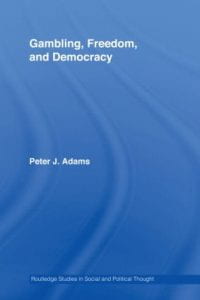During 2013 New Zealand’s centre-right (National) government, led by the then Prime Minister John Key, made a deal with Auckland’s SkyCity casino for a number of licensing concessions with the understanding they would fund the construction of a large convention centre. The concessions included increased numbers of electronic gambling machines and a license extension 35 years; these all in the context of previous legislation that banned casino expansion.
What is most revealing about this deal is the way it exposes how government leadership interacts with gambling and other addiction industries.
Two things stand out. First is the ability of gambling industry executives to foster close ties with government power brokers and, second, on the back of this, the way in which their money is used to influence policy and legislation.
Such connections are not unusual. Executives from of addictive industries like tobacco and alcohol have for generations pursued their interests with governments all over the world. What is unusual is having these processes so exposed—and exposed in such an unabashed fashion.
Most people are familiar with the way legalised addictive consumptions contribute significantly to poor health, social harm, crime, family misery and mental health. Stories on the harmful impacts of alcohol and gambling on people and families appear regularly in our papers. What is less commonly discussed is the reasons for why it is so difficult to address these issues.
A key aspect to the commercialisation of high-volume addictive products is the ability to generate add-on profits way beyond those of ordinary, non-addictive products, such as petrol and pizza. Addicted consumers, by the very nature of addictive behaviour, will consume to excess. Although they are considerably fewer than non-addicted consumers, they invest more heavily and, accordingly, contribute far more to profits. For example, Australian studies indicate that although the prevalence of problem gamblers is 1%–2% of most adult populations, problem gamblers contribute 40%–50% of what is spent on pokies.
This add-on money from addicted consumers then provides the financial base for a range of activities capable of influencing policy, regulation and public perceptions. It enables addiction industries to engage advertisers, lobbyists, PR companies and law firms in targeting the public with high profile charities and sports sponsorship and politicians with party donations, hospitality options, cross-board memberships and personal business involvements. The nature and extent of money involved in these activities are typically undisclosed.
We know little about the specific detail of these relationships and the overall processes by which such influences are exerted. This is unfortunate because it is these relationships that tend to determine whether initiatives at reducing harm get off the ground.
We saw this play out with the liquor reform bill, where, despite strong public outcry and strong evidence for public health interventions, Government has only managed to embrace minor changes.
The report by the Deputy Auditor-General Phillippa Smith revealed on-going links of John Key with SkyCity executives dating back to his first days as Prime Minister. One needs to wonder how it is possible for executives to so successfully engage the country’s leadership when public health professionals are seldom offered such advantages. The same question was raised in November 2011 by Professor Doug Sellman when he challenged the Minister responsible for alcohol policy, Peter Dunne, for engaging strongly with the alcohol industry and virtually ignoring leaders in public health.
Once such relationships are formed they provide the platform upon which deals can be struck. But this ‘deal’ tramples over the public health provisions of our current Gambling Act. It fails to address in anyway the extra harms that loosening of regulations will have on problem gamblers and their families; their needs are cut right out of the arrangement.
If the NZ Government was to look seriously at a balanced deal, it would also need to think seriously of ways of addressing the harms that such arrangements could create. For example, if it agrees to increasing the number of gambling machines then it could also include in such a deal some provision for reducing the addictive potency of putting these machines in casinos. Options could include, constraints on jackpots, limits on the amount or rapidity of bets, the ability of players to set limits on how much they spend, and many other features currently being applied in similar settings around the world.
To read more, see: Gambling, Freedom and Democracy
Text by Peter J. Adams


Recent Comments